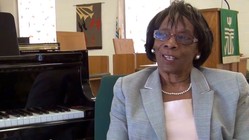When Samantha Piccolo of the Presbyterian Historical Society (PHS) sat down to interview Dr. Melva Costen for PHS’s Living History film project last fall, she expected to hear about Costen’s experiences chairing the committee that produced the 1990 Presbyterian Hymnal—a process that grew out of the historic reunion of the “Northern” and “Southern” churches in 1983 that formed the Presbyterian Church (U.S.A.).
Costen did, in fact, reflect on that experience, but she also shared other important stories during the interview now available online, particularly ones relating the personal struggles faced by her and her family during the Civil Rights Movement.
Costen is a lifelong Presbyterian, a musician, a former choir director and educator, a leader, and, as Piccolo termed her, “a source of inspiration and joy.” Her life story is full of rich experiences, including serving as the Helmar Emil Nielsen Professor of Music and Worship at the Interdenominational Theological Seminary in Atlanta, and authoring many works on music and worship.
Costen’s life also has been shaped by her work with civil rights leaders such as Dr. Martin Luther King Jr., participation in lunch counter sit-ins, and efforts to desegregate institutions across the south with her husband, the late Reverend Dr. James Costen. Her children also played important roles in the movement, including helping to integrate schools in Rocky Mount, N.C. The day the court ruled in favor of Costen’s son, Craig, being allowed to attend a whites-only school, “was one of our peak moments,” she said.
The interview with Costen can be viewed and downloaded, along with videos of other Presbyterians who have played crucial roles in American history. Others featured in the film project include former General Assembly Moderators Bruce Reyes-Chow and Rick Ufford-Chase, and former missionary and PHS volunteer, Sue Althouse, who relates her experience arriving in Japan in 1955 and ministering to people still recovering from World War II.
PHS is currently editing interviews with Bettie J. Durrah, Joan Gray, J. Oscar McCloud, James Foster Reese, and Parker T. Williamson. New films are posted every few months.
“I hope people will be inspired by what they see and hear from the Living History films, and that they will download them for use in discussion groups and classrooms,” said Piccolo, PHS’s director of development. “I also hope viewers will ask themselves the same question each interviewee is asked at the end of each taping: “How are you living history?”
Learn more at www.history.pcusa.org/lh.

